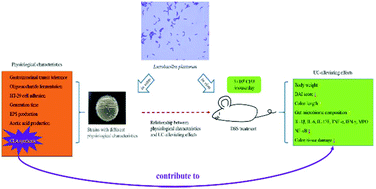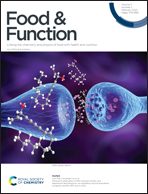Identification of the key physiological characteristics of Lactobacillus plantarum strains for ulcerative colitis alleviation
Abstract
Lactobacillus plantarum is a probiotic that is widely used to prevent ulcerative colitis (UC). However, the effects of this species are strain-specific. We believe that the physiological characteristics of L. plantarum strains may affect their UC-alleviating function. Therefore, this study investigated the relationship between the alleviating effect of L. plantarum strains on UC and their physiological characteristics in vitro. The physiological characteristics of 14 L. plantarum strains were assayed in vitro, including gastrointestinal transit tolerance, oligosaccharide fermentation, HT-29 cell adhesion, generation time, exopolysaccharide production, acetic acid production, and conjugated linoleic acid (CLA) synthesis. To create animal models, colitis was established in C57BL/6 mice by adding 3.5% dextran sulfate sodium to drinking water for 7 days. L. plantarum strains with significantly different physiological characteristics were orally administered to the mice at a dose of 3 × 109 CFU. The results indicated that among the tested L. plantarum strains, L. plantarum N13 and L. plantarum CCFM8610 significantly alleviated colitis in the mice, as observed from the restoration of the body weight and disease activity index (DAI) score, recovery of the gut microbiota composition, reduced expression of pro-inflammatory cytokines, and significantly inhibited expression of p65. Correlation analysis indicated that four of the measured physiological characteristics (gastrointestinal transit tolerance, HT-29 cell adhesion, generation time, and CLA synthesis) were related to the UC-alleviating effects to different degrees. The strongest correlation was observed between the CLA synthesis ability and UC-alleviating effects (with Pearson correlation coefficients for IL-1β, IL-6, IL-17F, TNF-α, myeloperoxidase, and the DAI all below −0.95). The ability to synthesize CLA may be the key physiological characteristic of L. plantarum in UC alleviation. Our findings may contribute to the rapid screening of lactic acid bacterial strains with UC-alleviating effects.

- This article is part of the themed collection: Food & Function Recent HOT articles


 Please wait while we load your content...
Please wait while we load your content...